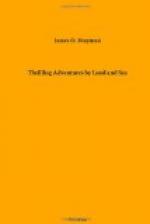“We were assisted from our horses by a remarkably ill-looking set of men, whom we supposed to have come out to see us from curiosity. An unprepossessing young gentleman, with a scar that divided his nose and his upper lip, and a silver-mounted dagger, took a seat near the Mullah, and a violent discussion immediately commenced, of the drift of which, we were, happily, ignorant. Soon, another party of villagers appeared, headed by another young man, who was quite the counterpart of the first, even to the scar in his lip; but his dagger-hilt and sheath were of solid silver, set with precious stones, and the long ringlets which hung upon his shoulders, were still more daintily curled. The arrival of this reinforcement renewed the violence of the discussion, between the Mullah on one side, and the young men on the other. It plainly related to us, and the fierce looks of the Kurds, as they walked to and fro with their hands on their daggers, would have alarmed us, had we not had full confidence in the power and good will of our friend. The controversy had a good deal subsided, when the approach of still another party renewed it once more. The Agha himself was coming. He was a man of fifty years, with a once gray beard, dyed a bright red, and with his lower eyebrows stained a livid blue-black. He greeted us with a ferocious smile, and entered at once into earnest conversation with Mullah Mustafa. The conversation was interrupted, now and then, by one of his amiable sons leaping from his seat, and speaking violently, to the great apparent satisfaction of the crowd.
“We soon learned the nature of these discussions from Khudr, who had been an attentive and agitated listener to the whole. The respectable old gentleman, it seems, had sent his first son to murder us, placing the second at a convenient distance to assist him. The latter, surprised that the business lagged, came up to see to it. And the Agha himself, finding that business lagged, came finally to attend to it himself. The Mullah urged the danger of injuring persons of consequence. ’The sword of the Frank is long,’ said he. But this argument was without effect. Mustafa then appealed to him not to disgrace his hospitality. These men were under his own protection, and he would not see them wronged. This argument also failed. He now urged that we were men of influence at Mosul, and were going direct to Constantinople; that, by securing our influence against his colleague and rival, Melul Agha, he might secure a perpetual supremacy in the district of Sherwan.
“This plea gained the case; the eyes of the old savage glistened with diabolical satisfaction as he thought of the villainous trick he was about to play upon his rival. He drew from his bosom a letter and handed it to the Mullah, who read it and handed it to our servant. It was written by Melul Agha, to Khan Abdul, our present host, directing him to take the rest of our property, and murder us without fail. This letter had been written on the blank page of another letter, sent to Melul Agha, by Mustafa Agha, of Ziba, who resides at Akkre. It was the last scoundrel who had sent letters in advance of us into the mountains, inviting them to murder us—and this, all for the sake of making a little impression on the government at Mosul.”




